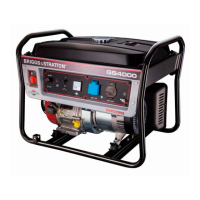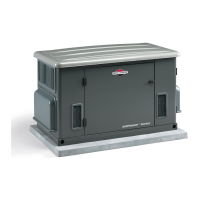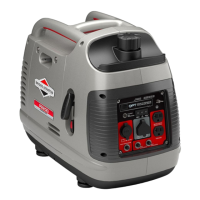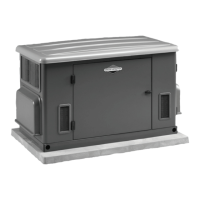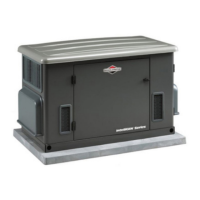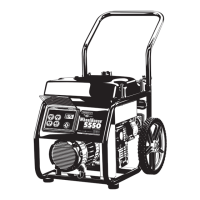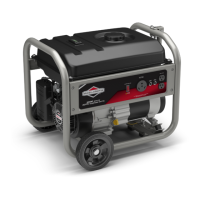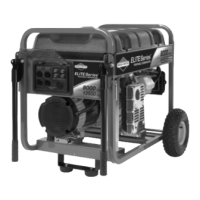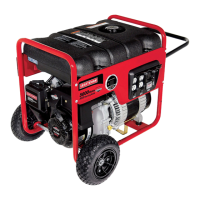10 BRIGGSandSTRATTON.COM
Circuit Breaker Figure
1
The circuit breaker(s) (G) will automatically open if the load exceeds the generator’s
rated output. If the circuit breaker opens, then reduce the output load and reset the
circuit breaker before resuming operation. To determine maximum output load, see the
Generator Capacity section.
Don’t Overload Generator
Capacity
Make sure the generator’s Starting Wattage* meets or exceeds the Rated (Operating) and
Additional Surge (Starting) Watts of the electrical devices.
1. Select the items you will power at the same time.
2. Total the rated (running) watts of these items. This is the amount of power your
generator must produce to keep your items running. See Wattage Reference
Guide.
3. Estimate how many surge (starting) watts you will need. Surge wattage is the
short burst of power needed to start electric motor-driven tools or appliances
such as a circular saw or refrigerator. Because not all motors start at the same
time, total surge watts can be estimated by adding only the item(s) with the
highest additional surge watts to the total rated watts from step 2.
Example:
Total Rated (Running) Watts 1555
Highest Additional Surge Watts + 600
Total Generator Output Required =2155
NOTICE If total generator output required does not contain additional surge watts, DO
NOT exceed generator’s rated wattage.**
*See Starting Wattage in the Specifications section.
**See Rated Wattage in the Specifications section.
Power Management
Failure to properly connect electrical devices can result in damage to the generator or
to connected electrical devices. The correct and safe way to manage generator power is
to sequentially add electrical devices (loads) as follows:
1. Before you start the engine, make sure that all electrical devices are
disconnected from the generator outlets.
2. Start the engine (see the How to Start the Engine section).
3. Connect the electrical device that requires the most watts (load).
4. Let the generator output stabilize (engine runs smoothly).
5. Connect the next electrical device.
6. Again, let the generator output stabilize.
7. Continue following the above steps to add electrical devices. Make sure the
total watts (load) of all electrical devices does not exceed the generator’s
wattage capacity (see the Specifications section).
NOTICE
Exceeding generators wattage/amperage capacity could damage generator
and/or electrical devices connected to it.
• DO NOT exceed the generator’s wattage/amperage capacity.
• Start generator and let engine stabilize before connecting electrical loads.
• Connect electrical loads in OFF position, then turn ON for operation.
• Turn electrical loads OFF and disconnect from generator before stopping generator.
Tool or Appliance Rated (Running) Watts
Additional Surge
(Starting) Watts
Window Fan 300 600
Deep Freezer 500 500
Television 500 —
Security System 180 —
Light (75 Watts) 75 —
1555 Total Running Watts 600 Highest Surge Watts
Wattage Reference Guide
Tool or Appliance
Rated* (Running)
Watts
Additional Surge
(Starting) Watts
Essentials
Light Bulb - 75 watt 75 —
Deep Freezer 500 500
Sump Pump 800 1200
Refrigerator/Freezer - 18 cf 800 1600
Water Well Pump - 1/3 hp 1000 2000
Heating/Cooling
Window AC - 10,000 BTU 1200 1800
Window Fan 300 600
Furnace Fan Blower - 1/2 hp 800 1300
Kitchen
Microwave Oven - 1000 Watt 1000 —
Coffee Maker 1500 —
Electric Stove - Single Element 1500 —
Family Room
DVD/CD Player 100 —
VCR 100 —
Stereo Receiver 450 —
Color Television - 27 in 500 —
Personal Computer w/17 in monitor 800 —
Other
Security System 180 —
AM/FM Clock Radio 300 —
Garage Door Opener - 1/2 hp 480 520
DIY/Job Site
Quartz Halogen Work Light 1000 —
Airless Sprayer - 1/3 hp 600 1200
Reciprocating Saw 960 960
Electric Drill - 1/2 hp 1000 1000
Circular Saw - 7-1/4 in 1500 1500

